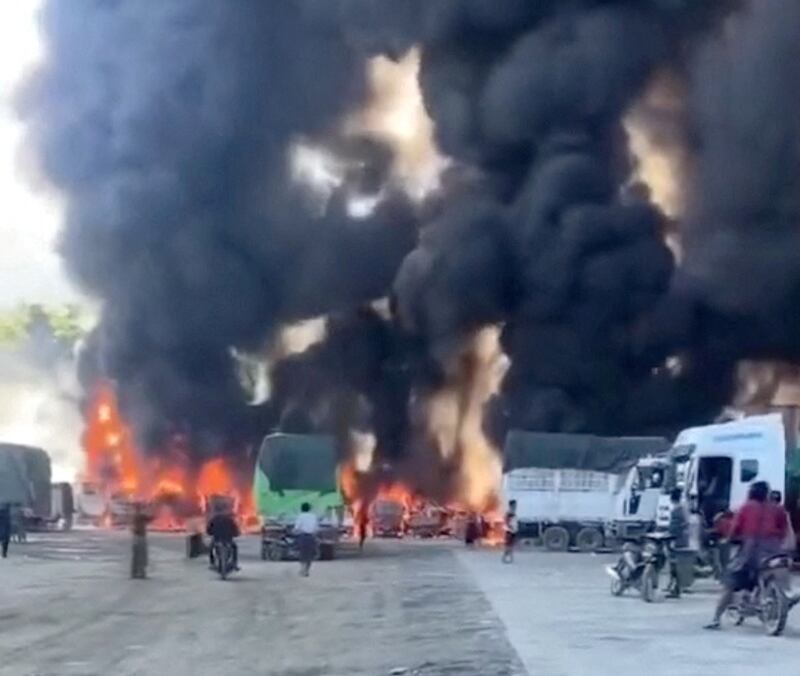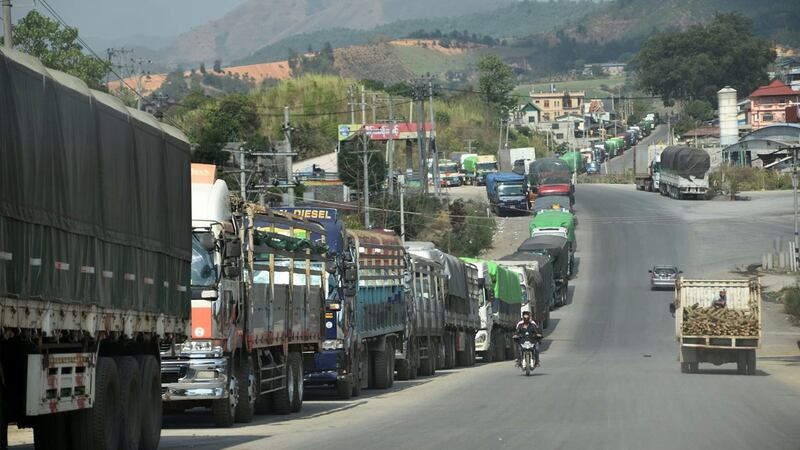Trade across Myanmar’s shared border with China has ground to a halt amid a six-week offensive by ethnic rebels fighting junta troops in the country’s Shan state, according to merchants, causing an estimated loss of more than US$500 million in commerce.
Since the Arakan Army, the Myanmar National Democratic Alliance Army, and the Ta'ang National Liberation Army launched Operation 1027 – named after the Oct. 27 military actions that started it – as part of the "Three Brotherhood Alliance," junta troops have been on the retreat in many areas, leading junta chief Senior Gen. Min Aung Hlaing in late November to issue a rare acknowledgement of the rebel's successes.
After fighting began, merchants told RFA Burmese, trade ceased at Muse and Chinshwehaw – two key border towns positioned across from southwest China’s Yunnan province.
“Trade has totally stopped there – only hand couriers are seen at the border gates, carrying traditional foods,” said a merchant in Muse who, like others interviewed for this report, spoke to RFA on condition of anonymity due to security concerns.
There were no civil servants to process cross-border trade left in the trade zone, he said. “Fighting breaks out every once and a while, lasting for 10-15 minutes each time.”
Prior to the offensive, the value of bilateral trade at the two border towns was more than US$10 million per day, according to junta’s Ministry of Commerce data. So in the 50 days since the start of “Operation 1027,” that would amount to more than US$500 million in losses.
Corn, rice, cotton, machinery
There are two major border gates — Muse-Mang Wein and Kyin San Kyawt — used for bilateral trade at the two border towns, but neither is open amid the clashes. The Myanmar National Democratic Alliance Army, or MNDAA, now controls Kyin Sang Kyawt, where nearly 100 trucks were destroyed by military shelling on Nov. 23.

Myanmar exports agricultural goods to China through the Kyin San Kyawt border gate in Chinshwehaw that include corn, rice, rubber, black sesame, dried elephant foot yam, green gram and groundnuts, and imports cotton, raw plastic, machinery, chemical fertilizers and medicine.
Myanmar’s exports through the Muse-Mang Wein border gate in Muse include eel, crab, prawns, cotton, rubber, corn, peanut, groundnuts, rice, broken rice and turmeric, while imports consist mainly of fuel and machinery.
Area aid workers said at least 10 civilians, including children, have been killed in the fighting during the offensive.
A merchant at Chinshwehaw told RFA that commodities are stranded at the border gate.
“Commodities from the Chinese side were sent back as they blocked the border gate,” she said. “But Chinese goods on our side have sat stranded in the fields and warehouses. We are waiting to pay taxes.”
The costs associated with the transportation of goods have skyrocketed during the conflict, a third merchant told RFA.
“The cost of transporting goods on a 17-ton truck on the route from [Shan state’s] Mongla township to Mandalay [800 kilometers, or 500 miles to the east] was 7 million kyat (US$3,330),” he said. “In Chinshwehaw, the cost has increased by more than four fold. Fuel prices have also increased.”
Both merchants and farmers have suffered losses, and more than 1,000 common laborers have lost their jobs at the trade zones, said residents and merchants.
No end in sight
Li Kyarwen, the spokesperson of the MNDAA, said that it isn’t possible to restore bilateral trade in northern Shan state anytime soon.
“During the ‘revolutionary period,’ due to the lack of peace and security, business can’t be resumed immediately,” he said.

But merchants warned that if the border gates don’t reopen by the end of December, there will be a shortage of Chinese commodities, “and prices will surely soar.”
Attempts by RFA to contact the junta’s Ministry of Commerce for comment on the halt to border trade went unanswered.
Reports of the closed checkpoints came a week after junta Foreign Affairs Minister Than Shwe met with Shi Yugang, the deputy secretary of the Yunnan Provincial Party Committee during a visit to China, at which the two discussed border trade issues.
While the junta’s peace negotiation committee has held talks with the Three Brotherhood Alliance to end all conflict in Shan state near the border, little progress has been made and fighting continues daily.
Translated by Aung Naing. Edited by Joshua Lipes and Malcolm Foster.
